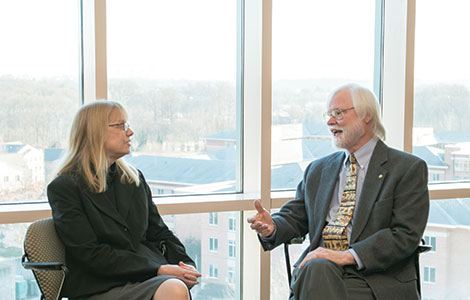A university is only as good as its library, and the Albin O. Kuhn Library & Gallery is at the heart of UMBC’s intellectual enterprise. The library has been built by a dedicated staff over 50 years, so UMBC Magazine asked two of its longest-serving employees –acting director Joyce Tenney ’79, ancient studies, and chief curator Thomas Beck – for their perspectives on this essential campus institution.
UMBC’s first employee was a librarian, and the library is the place on campus where the staff members connect most directly with students and faculty. What role have staff members played in building a wonderful research library at UMBC?
Thomas Beck: One of the characteristics of the library is it’s always been like a large extended family. This was true from the beginning, I would judge, but certainly when I got here, which was 1974, it was surely that way. At that time, everybody interacted with everybody on a daily – sometimes hourly or minute-to-minute basis – and people got to know each other very well.
Unlike other libraries, our library has always had a relatively flat administrative structure. Joyce’s door is always open and all of her predecessors I think pretty much had the same feeling.
Joyce Tenney: That extends down to the student employees. I was a student assistant, and they just kind of fold you into the family. I got a phone call a couple months after I graduated and some the supervisors I had worked for said: “OK, there’s an opening. Get your application in now.” And even after I was hired, my supervisor eventually looked at me and said, “You’re not checking in standing orders forever. You’re going to library school.” And she handed me the application form to go to College Park’s library school at night and continue working. It’s a place where people try and help people move forward. It’s just a very caring and committed group and always has been.
As staff members who have seen much of the arc of UMBC’s development as a university, are there qualities that are part of the DNA of the institution?
Beck: Absolutely. The essay I’m writing for the exhibition we are putting together for UMBC’s 50th anniversary says that UMBC started as a need, became an ideal, and then became a reality. And, in fact, we are still a need, we are still a reality, and we’re still an ideal. Maybe an ideal most of all. UMBC is an ideal toward which we all are striving, and we happen to have had, over the years, good leadership in pursuing that ideal and keeping it in the forefront of the minds of people at UMBC – and also people who are outside UMBC or want to come to UMBC.
In terms of the library, that reaching for an ideal is characteristic of the library and its staff. The library staff has always been very service oriented, and it continues to be that way up to the present.
Tenney: I think one of our greatest attributes at UMBC is community. UMBC has always been a community. I looked at a number of colleges before I chose where I was going to go. I actually was offered scholarships at other places, but I’m a total introvert, a complete introvert, and I toured UMBC after touring College Park and a few other places and I just looked at my dad, and I said, “I’m comfortable there [at UMBC].” And from your first advising session, everyone was very committed to making sure that you’re in a place that you need to be. And I think that continues through today. I’ve gone out with the admissions folks in the evening to do recruitment, and I run into people that went to UMBC that now have children that are college-aged, and we start joking around about the 70s and the 80s at UMBC. It was a community then. I think it’s very much a community now.
I personally keep in touch with student assistants who have worked for me over the years. I just sent a number of Christmas messages off: “This is your surrogate mother checking in. How are you? What’s going on in your life?” I think that continues to this day and it makes UMBC unique. It makes UMBC a great place.
— Richard Byrne ’86
Tags: Winter 2016

